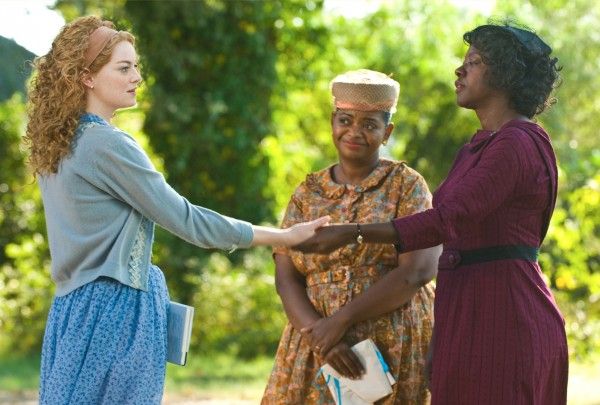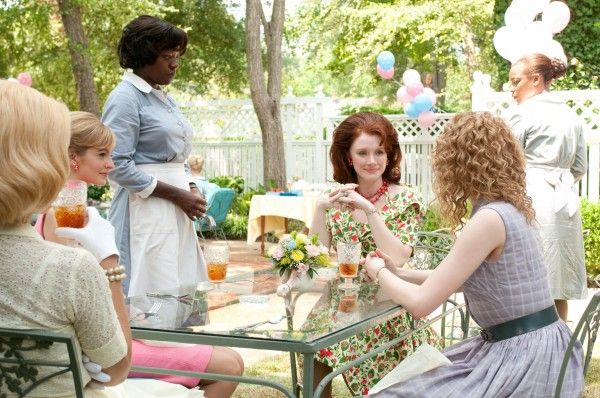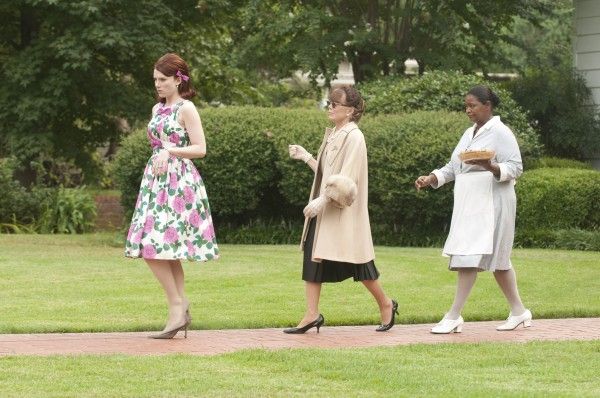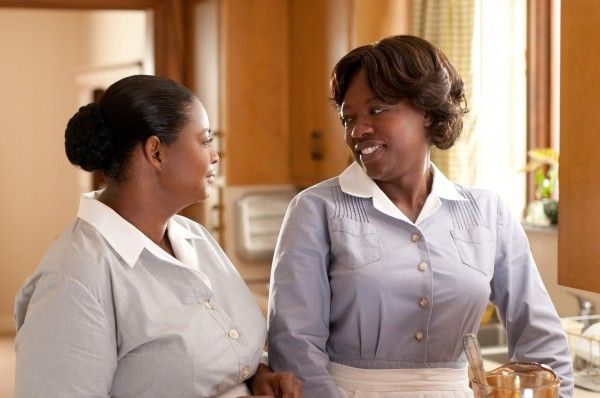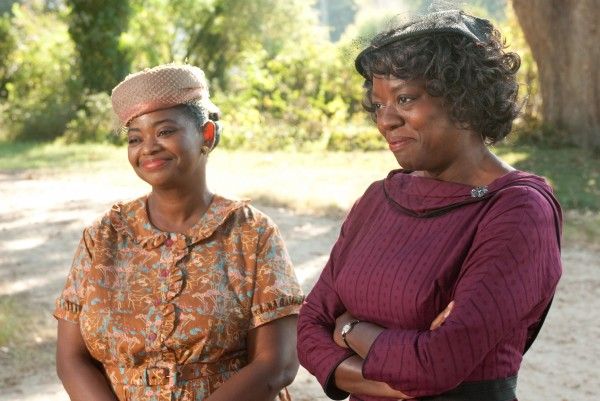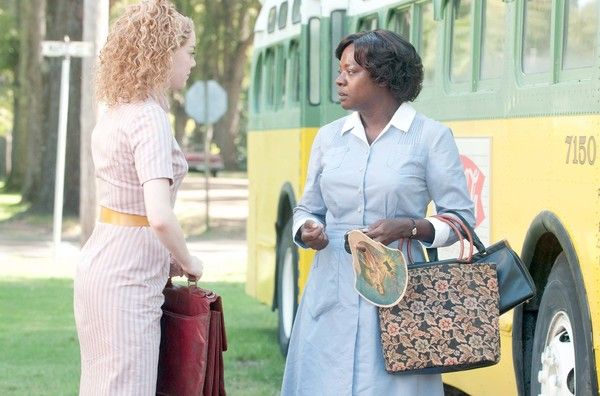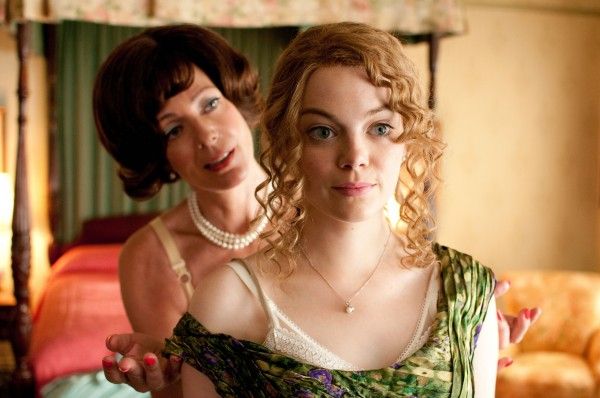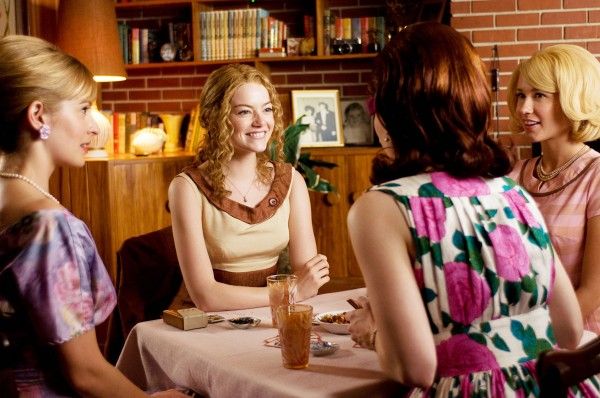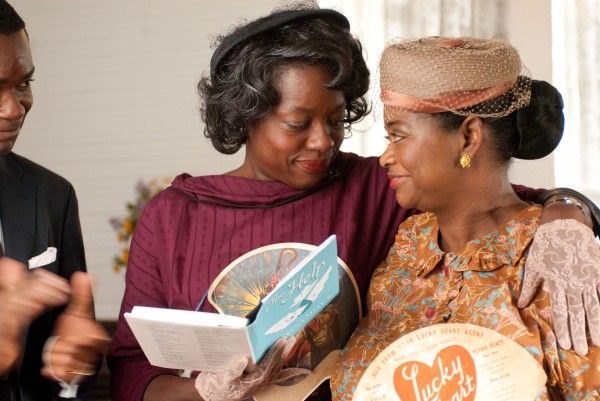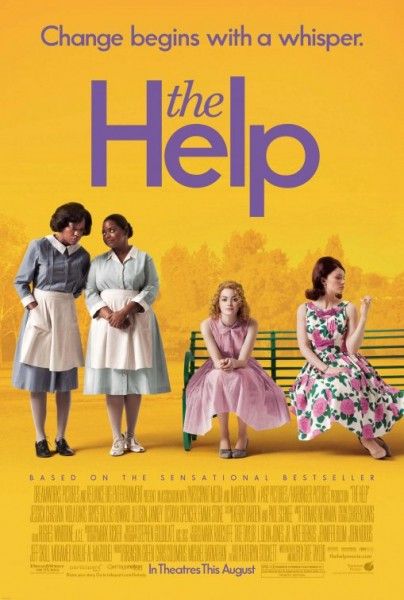The Help, adapted from the best-selling novel of the same name, is one of those films that makes you laugh and cry, and then think of the Oscars. The performances are terrific from everyone, the story is both heartwarming and heartbreaking, and the music is perfectly complimentary. Multiple Grammy Award-winning recording artist Mary J. Blige contributed to the score by writing and recording the original end-credit song, “The Living Proof,” after she was touched when she saw an early screening of the film. Inspired by the women in the story, she was moved by the celebration of courage and wanted to help get the film’s message out to audiences.
At the film’s press day, music superstar Mary J. Blige, who has sold over 50 million albums in her career, talked about how easily the end-credits song for The Help came from her emotional reaction to the film, how she hopes the song gets recognized come award season, the secret to sustaining a 20-year career in the music industry, how she keeps her live performances fresh and exciting for each audience, and how she is finishing up her next album, My Life II: The Journey Continues. She also talked about her desire to do more acting, her upcoming role in the highly anticipated Rock of Ages, opposite Tom Cruise and Julianne Hough, and how she would like her career to follow in the footsteps of Queen Latifah, whose proven that you can do it all. Check out what she had to say after the jump:
Here’s the film’s synopsis:
At the dawn of the Civil Rights movement, 22-year-old Skeeter (Emma Stone) has just returned home after graduating from Ole Miss and her mother just won’t be happy until she finds a husband. Aibileen Clark (Viola Davis), a wise African-American maid and caretaker suffers after the loss of her only child. And Minny Jackson (Octavia Spencer), Aibileen’s sassy best friend, has a reputation as the best cook in Mississippi, but struggles to find and hold a job. Seemingly as different from one another as can be, these women will nonetheless come together for a clandestine project that will put them all at risk. Through it all, a remarkable sisterhood emerges from their improbable alliance, instilling all of them with the courage to transcend the lines that define them, and the realization that sometimes those lines are made to be crossed.
Question: How did you get involved with The Help? Were you brought in to specifically write a song for the film, or did you wait to decide that until you saw the film?
MARY J. BLIGE: I was brought in specifically to write a song. I was asked to see a screening first, and I saw it twice. I began to write different things down, when I saw the movie. I wrote down when I cried, I wrote when I laughed, I wrote when someone said something, and I wrote different things that jumped out at me. The film and television department at my label asked me to do it, and of course my management asked me to do it. I loved the movie. I cried really hard, I laughed really hard, I got angry, and I went through all kinds of different things. I typed all those things into my phone, and by the time I got to the studio to write the song, it was almost basically written.
Being from New York, how aware were you about what went on in the South during this time period?
BLIGE: Both sides of my family are from Savannah, Georgia, and my aunt was a maid. We used to go down South every summer, and she was the maid for a wealthy white family. I remember her bringing the children to my grandmother’s house to play with us, and I remember the family loving her. I don’t know if she had to use the bathroom outside or anything like that, but I know the family loved her. Just like Aibileen in the movie, she would encourage them. Whatever she would say to them, it helped them through college. They’re grown people now.
What most impressed you with the performances in The Help?
BLIGE: What most impressed me was Aibileen’s courage and Minnie’s strategic plays. At a time like that, they didn’t think she was that smart to use the shit-pie as leverage to get out of that stuff. She was very strategic. All the women did great.
Was this the first time you’ve written a song specifically for a film?
BLIGE: No, this is actually the second one that I wrote that was tailor-made for a film. It’s just that this one is a real situation where it’s being placed where they said it was going to be placed. The first time was Precious.
What was the biggest challenge in writing this particular song?
BLIGE: The only obstacle was me trying not to be literal. I didn’t want to call the song, “You Are Smart, You Are Kind, You Are Important.” I didn’t want to call it, “Chicks that Stick Together.” That was the challenge. The challenge was, “What is it?” So, when Aibileen was fired and walking up the road, I just saw that her journey was going to be long because that was such a long walk she had. She was by herself and she had come to a conclusion that, “I’m free and I’m a writer, so I can speak to my people.” She’s the living proof. She’s proof that you can come out of something terrible and still have the rest of your life ahead of you.
With the state of record companies and record sales, is writing songs for movies the way to go?
BLIGE: Nowadays, with the state of the music business, for any artist, whether you’re up-and-coming or you’ve been in it for awhile, you have to explore different revenues and different ways of expressing yourself. Because this one is closing in and is becoming a place where it’s not about your talent, but it’s about you being a needle in a haystack, or how skinny or fat you may be, or how light or dark you are. It’s really that intense, in this music business, and so many artists don’t get a fair shot because they might be too heavy or too dark. I’m not a writer for movies. This was just a blessing that fell in my lap, just like Precious was a blessing that fell in my lap. I wasn’t beating someone’s door down, saying, “I’ve gotta write a song for your movie." This is a beautiful thing because all the businesses are suffering, so you can’t just look at it like, “Well, what about me?” You have to look at it like, “Okay, what else can I do?,” so that I’m not beating down someone’s door that don’t want me in. The music business is really, really small. The real music is becoming almost extinct, if you don’t stay true to who you are. This is me staying true to who I am, and this is a place where I actually get a chance to continue to flourish as the artist that I am. A great story in music is missing these days. We’ve got a couple. Adele has got a good story, and that’s what people want. From the beginning to the end, what’s going to happen? By the end, you’re cheering for her.
Is that why you think your career has lasted 20 years now? Is your secret that you know what your story is?
BLIGE: Yes.
Is it easier for you, as a writer, to determine ahead of time what you’re going to write about for an album, rather than trying to figure out what you want to say, song by song?
BLIGE: It’s easier to know what you’re going to do. You have to have a plan. Everything has to be planned. For me, I start with the title of my album, before I even start with the songs. My album is called My Life II: The Journey Continues. And then, it’s about, “What do I want this album to say?” I write down different things that I want it to say, and then the songs come from the different words. You’ve gotta have something to draw from.
When you’ve been in this business as long as you have and you tour all the time, is there something that you do for yourself to keep the performance fresh and exciting for each audience?
BLIGE: You have to create different things, either through lighting or changing the format of the songs and how you’re going to sing them, and even sometimes props. I can go out raw with nothing and my fans would still be happy, but I feel that I owe it to them to give them almost like a Broadway musical, at this point in my life. I have to give them something more, so I do have to think of different ways to do it.
What’s next for you, career wise? Do you want to do more acting?
BLIGE: Yeah, I’m trying some of that. I’m studying really hard. I have my acting coaches and I’m getting better. I don’t know what else is going to come of it, but I’m definitely going to try it.
What is your next acting project?
BLIGE: I’m doing Rock of Ages. That’s going to be fun.
How has it been to prepare for that?
BLIGE: That’s fine. Preparing is just like preparing for anything. I have to find out who this character is. I play a Gentleman’s Club owner, whose name is Justice Charlier. I have to put together who she is. Does she have struggles? Is she going through things? Is she the person that’s always bubbly and strong, but with the most problems? That’s the inner work. So, I have an acting coach and I’m reading books on acting.
Do you have any scenes with Tom Cruise?
BLIGE: I don’t know. I think we have a singing scene together – all of us.
Are you going to coach him with his singing?
BLIGE: I don’t have to coach Tom. He actually sounds really good. He can do anything.
Who are most of your scenes with?
BLIGE: The lead character – Ryan Seacrest’s girlfriend, Julianne Hough. Most of my scenes are with her.
When do you start working on that?
BLIGE: I start filming July 25th, for about three weeks.
What was it like to have the live theater experience?
BLIGE: I did the Off-Broadway play The Exonerated, and I played Sunny. It was good. I was nervous at first, but once I got into the character, by the time I was done, I wanted to kill myself. I’m serious. It was that much of a depressing role. I really didn’t want to live anymore, and I didn’t understand it, but I think it was Sunny’s character. She went to jail for nothing, for 20 years. She was just in the wrong place at the wrong time, and she had to find the light in such a dark situation. It was about different people that were exonerated and it was the stories of everyone else that were making me depressed. Guys were going to prison and getting raped. It was just crazy.
Would you do it again?
BLIGE: I wouldn’t do The Exonerated again, but I’d do Broadway again.
Are there any singers turned actresses that you’re inspired by and would love to follow the trajectory of their career?
BLIGE: Queen Latifah – that’s it. And, I’m shocked at Justin Timberlake right now.
Do you think this business forces you to make a choice between music and acting?
BLIGE: I think Justin might be loving the acting part of it. I love the music part of it. It’s my baby and my first love. I just want to do this, but do a little of that. Music is where my love is. I don’t think the acting thing is going to start outweighing that, but I think it’s going to start being a good chunk of something I want to do.
Would you like to do a full-blown comedy?
BLIGE: I think I could do comedy.
Have you ever done comedy?
BLIGE: No, but my friends know me for being funny.
Do you have any touring plans?
BLIGE: No, I’m just finishing the album.
When is the album coming out?
BLIGE: Supposedly, October 4th, but I’m trying to get this project right. Based on the title alone, it has to be right. The very first My Life album is just everybody’s favorite, not that I’m trying to beat that first one, ‘cause I can’t.
What was the inspiration for calling this album My Life II?
BLIGE: The fact that we survived My Life. After that album, we were all ready to die. We were ready to jump off a building. Anything to get up off this Earth, we were ready to do. We were very down and depressed. On this one, not only did we learn, but we learned how to regroup and survive. Not that we’re not going to have trials and tribulations or issues, or things like that, that need to be addressed, but now it’s about how to get out of them. I believe there should be no more drama, but it’s everywhere you go. It’s just about how you get out. You’ve gotta bob and weave because it’s everywhere. How do I keep the drama low? It’s about using your head.
Do you hope your song for The Help gets recognized come award season?
BLIGE: I hope so! It would be okay, if it gets nominated. I’m not going to say that I don’t want it to happen. I want it to happen. I really do.
Are there any other musical artists that you would like to collaborate with or do another cover of?
BLIGE: Right now, at the top of my list is Anita Baker, who is a really good friend and almost an angel to my career. I did something with Bono and U2 already. That was a dream come true.
What was it like to work with Anita Baker on your BET Awards performance?
BLIGE: She’s so humble. She’s one of the people in the music industry, out of the older generation, that’s not mean. Patti [LaBelle] is sweet, too. Patti and Anita are just very, very sweet people. They just have a youthful spirit and they’re very humble. Anita just kept saying, “I’m thankful. I’m grateful.” I was like, “Stop bowing. You’re the reason why I’m standing here, right now. It’s your song, ‘Caught Up in the Rapture,’ that I sang at the Galleria Mall that I gave to (record executive) Andre Harrell.” She’s beautiful.
What’s it like to have so many young people look up to you, in the way that you look up to Anita Baker?
BLIGE: It’s beautiful. It’s the real blessing. They like you, so you have to like you. You’ve just got to show them that you love them and you want them to move on and end up, 20 years from now, having to open their arms and embrace a younger generation. Whatever you want them to be, you have to be an example. When I met Ashanti, a long time ago, I just opened my arms and held her because I knew what I was to her. When I met Beyonce or Alicia Keys, or any of the girls, I’ve always been smart enough and loving enough and thankful enough to know that I’m an inspiration to them, so why would I be mean or nasty to them?
Do you mentor anyone in the younger generation?
BLIGE: No, I’m not mentoring anyone. If they called me or asked me a question or needed my help, I would do that, but I’m not a mentor. I have a foundation, where I mentor girls. I have a center in Yonkers, where I grew up, called the Mary J. Blige Center for Women. There’s a GED program there, there’s a child care system that takes care of their children when they’re trying to get jobs, there’s a computer room, we’re going to put a fitness center there too, and stuff like that. We’ve already sent 25 women to college on four-year scholarships, and we’re set up to send 25 more women. We’re a baby in this, but that’s my mentorship.
When the What’s the 411? album came out, did you have a vision that you would still be in this business, 20 years later, or do you just feel blessed to be at this point?
BLIGE: I always knew. No, I’m just kidding. I didn’t have a clue. During the What’s the 411? album, it was a big blur. Right now, I’m so thankful. It does not have to be this way. I don’t have to be here right now, and still be relevant to the new generation. It’s just crazy.
How long do you see yourself doing it?
BLIGE: For a little while longer. When it’s over, it’s over, but it’s not over yet. I don’t know. I’m not going to put a number on it. People can say, “Oh, we love you. We need you. We want you.” When it shifts, you know. When that happens, I’m hoping that my entrepreneurial side will have me at a place where I don’t have to do anything. That’s what I’m striving for.

